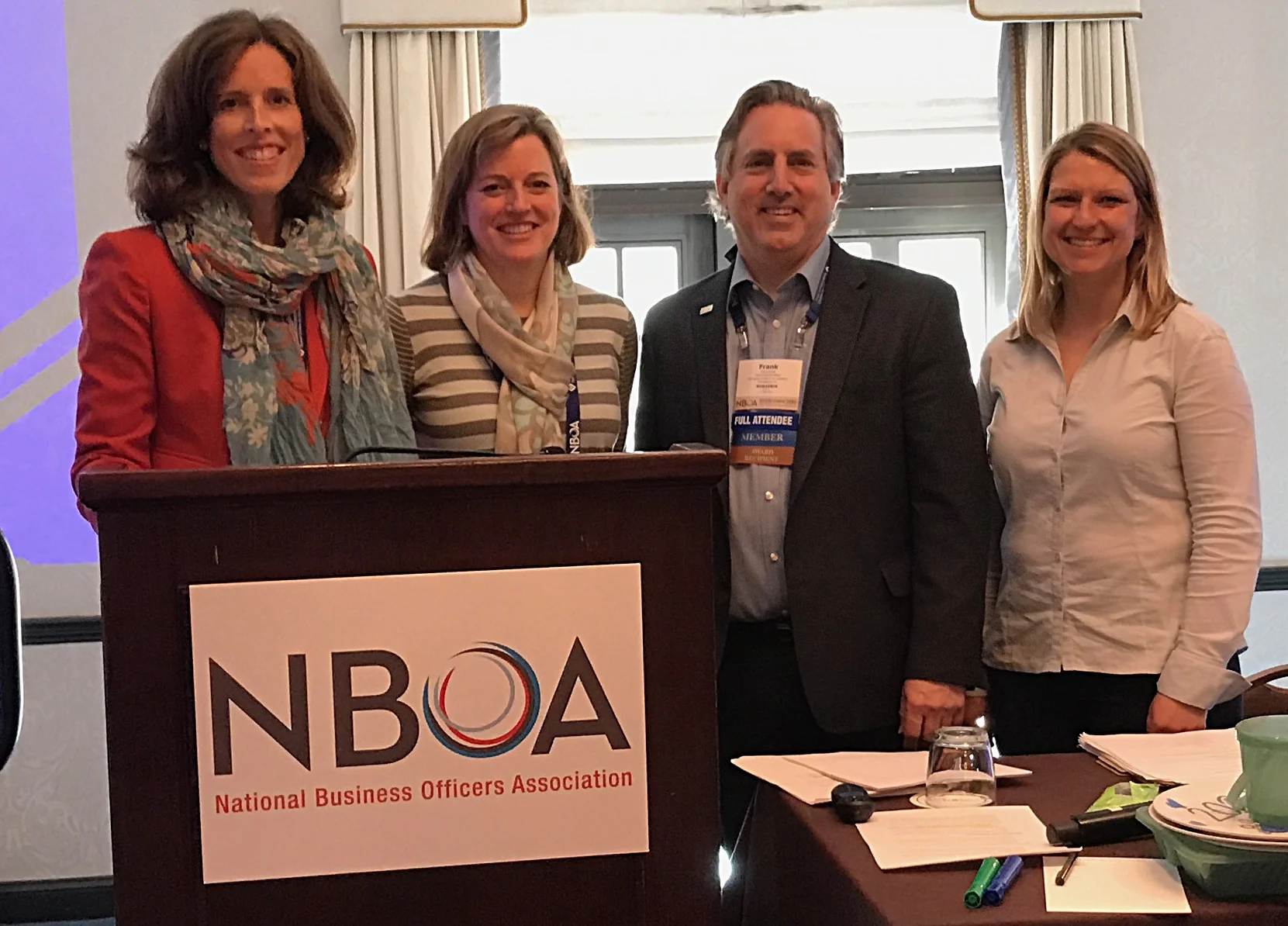Boyer Sudduth’s intern, Kaitlin Reese, recently caught up with Springside Chestnut Hill Academy’s upper school science teacher, Ellen Kruger.
Join the Team!
Climate Change Education: From Community to Classroom -- Philadelphia Teachers Participate in 3-Day Training
The Case for Outdoor Learning During COVID-19
Save Money. Save Energy. Save the Planet: A New Focus for the Climate is Everybody's Business Project
Given the current social and economic challenges facing local businesses and non-profits, in the next phase of Brookline’s Climate is Everybody’s Business the project’s emphasis will shift slightly. While environmental issues will remain at the project’s forefront, the refocus to “Save money. Save energy. Save the planet.” will emphasize how sustainability efforts can provide economic benefits during this challenging time. While the project’s focus remains on fighting climate change, its leaders are committed to building not only a sustainable future, but one that is also racially, socially, and environmentally just and equitable.
“Plant-Forward” School Menus: Reduce Costs and Climate Footprint
Shifting school food purchasing is a powerful climate mitigation strategy that remains largely untapped. Yet replacing resource-intensive animal products with plant-based proteins is a relatively simple approach that can generate large climate benefits as well as cost savings. An inspiring story from the Oakland Unified School District (OUSD) provides a roadmap for tapping into this strategy.
Food Recovery: How Boston College Prioritized Sustainability During COVID-19
After millions of students were out of the classrooms, and academic institutions were forced to transition online due to COVID 19, academic dining facilities were left with unforeseen revenue losses and potentially large sums of food waste. Colleges specifically were left with almost empty dining halls and overflowing kitchens. While colleges and universities, like Boston College, were able to allot stocked meals for students and faculty still on-campus, dining facilities were forced to find creative ways to incorporate food recovery in their operations.
Courtyard Renovation Sparks a Green Future for Reading High School
While the 2019-20 school year may have been an unconventional academic year for Reading High School (RHS), it has been a year of green changes. During this time, the school created plans to transform its overgrown and underused interior courtyard into a welcoming outdoor classroom and natural refuge. Students and teachers of a “green team” led these efforts. Their hard work paid off: RHS became the first school in Berks County, PA to become a certified National Wildlife Federation Eco School, achieving the bronze award for its “schoolyard habitat” improvements.
Disrupting the Throwaway Mindset: Moving Towards a “Circular Economy”
So--you might have heard the term circular economy thrown around before, but what exactly does it mean for schools? Proponents of a circular economy hope to combat our cognitively engrained throw-away culture, and focus instead on keeping materials in use for as long as possible. Schools have ample opportunity to engage with the circular economy framework, and ultimately align their actions with their organizational values.
Tools for Moving Your Campus to 100% Clean Energy
Educational institutions are instrumental in accelerating the transition to clean energy. As centers of scholarship, innovation, and technical expertise, they are well-positioned to lead the charge towards sustainability. Here are tools educational institutions can use to transition to clean energy as outlined in Environment America’s fact sheets, which can be found at https://environmentamerica.org. While written with higher education institutions in mind, much of the report’s guidance is applicable to K-12 schools as well.
How to Use Positive Psychology for Better Climate Conversations
When the world changed overnight from COVID-19, so did climate related conversations. It quickly became clear that to maintain momentum in our varied efforts to address climate change, we would need to revisit how to talk about our warming planet in this new global context. One source of guidance for this reframing is Positive Psychology, the scientific study of the strengths and virtues that enable individuals, communities and organizations to thrive. The field is founded on the belief that people want to cultivate what is best within themselves. Boyer Sudduth Environmental Consultants teamed up with University of Pennsylvania Lecturer Kim Quick to share tips on how to start compassionate, inclusive climate conversations.
PAISBOA Hosts Environmental Sustainability Webinar
With Earth Day around the corner, PAISBOA recently hosted a webinar on Leading Change: Environmental Sustainability. Sponsored by PECO Smart Energy, the program featured Mary Ann Boyer and Anne Sudduth of Boyer Sudduth Environmental Consultants along with Chief Financial Officers Frank Aloise from Springside Chestnut Hill Academy (SCH) and Miriam Fisher Schaefer of Friends Central School (FCS).
Green Business on the Hill: Six Businesses Receive Three Leaf Awards
In early March, before our world was turned upside down by the pandemic, 54 businesses took the 2020 Green Business on the Hill self assessment led by the Chestnut Hill Business Association and Boyer Sudduth Environmental Consultants. This second installment of the self assessment consisted of 105 questions covering how businesses handle waste, energy usage, and healthy air quality in their workplace.
Philadelphia Sees Improving Air Quality as More People Work From Home
Since January, many cities around the world have been shutting down to slow the spread of coronavirus. In Philadelphia, the order to work from home issued by Governor Tom Wolf has forced all non-essential workers to remain home, which has been very disruptive to businesses and many people’s daily lives. However, the order is thought to have had a positive impact on the city’s air pollution.
PAR Recycle Works: Recycling Electronics & Restoring Lives
PAR Recycle Works (People Advancing Reintegration), a nonprofit electronics recycler, provides transitional employment to people returning from prison. This Germantown-based organization diverted over 250 tons of electronic waste (or “e-waste”) from the landfill. E-waste contains materials that can be upcycled or reused if recycled properly, such as the copper in wires or the gold in computer motherboards.
Chestnut Hill Businesses Learn that it’s Easy to be Green
Interested in greening your business and learning practical solutions? Chestnut Hill Business Association and Boyer Sudduth Environmental Consultants partnered again in the “Green Business on the Hill” program -- now in its second year. This program is for businesses and other organizations who want to green their operational practices in terms of energy, waste, climate and air quality.
A Picture is Worth a Thousand Words
Climate Change: From Classrooms to Community -- Revisiting Climate Change Teacher Training
On Saturday, January 25th, 2020 a group of dedicated teachers braved rainy weather to attend a Philadelphia GreenFutures Climate Change Teacher Training Workshop at Fairmount Water Works. A partnership between environmentally focused organizations organized this event for Philadelphia School District teachers to discuss their progress following last summer’s three-day summer climate education workshop.
Aquaponics in the Classroom: PAISBOA Sustainability Group Visits Agnes Irwin School
The PAISBOA Sustainability Group convened at The Agnes Irwin School (AIS) on January 14th. Head of School, Dr. Wendy Hill, welcomed over 36 participants from 13 different institutions and highlighted how sustainability has been integrated into the buildings and classrooms at AIS along with a special focus on aquaponics.
Composting at Mt. Airy Nexus Made Easy with the Help of Tim Bennett
Composting in Philadelphia has not always been so easy. This is what inspired Tim Bennett of Bennett Compost to start his own company to help make Philadelphia a greener city. Ten years ago while living in a second-floor apartment in South Philly, Tim Bennett struggled to find a facility that would compost his food waste. He quickly discovered that there were no on-site composting site for city residents. This may discourage most folks, but not Tim.






















